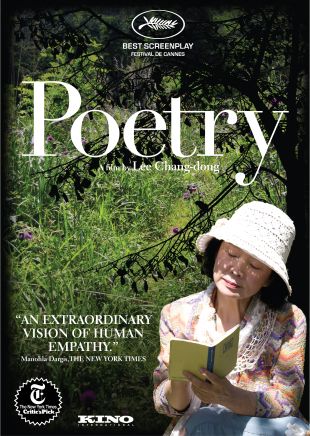
Certain indigenous films seem ill-suited for exportation -- features so immersed in the idiosyncrasies of their respective cultures that some narrative developments fail to compute outside of the countries of origin. Given the fact that most moviegoers are conditioned to read onscreen events according to the customs, mores, and behavioral strictures of their home countries, a minimum of at least some explanation helps to even understand why the characters in these films are responding as they do. Poetry, a domestic drama by South Korean director Lee Chang-dong (Secret Sunshine) epitomizes this idea and may find limited international footing as a result.
Consider, for example, the following scenario. An elderly woman who has sole custody of her teenage grandson discovers that the boy participated in the serial rape of a female classmate (conducted with his buddies) over the course of many months. Their repeated assaults eventually prompt the young girl to take her life by diving off a bridge. That's the basic setup of Poetry. Now, consider the events that might follow that discovery in an American or European drama: possible police intervention and potentially criminal charges being filed. And, within the boy's family, tremendous strife and conflict -- grief, remorse, and questioning of how the young man's upbringing went so tragically off-kilter.
Curiously, though, almost none of this happens in Poetry. We get the discovery of the rapes, but for the bulk of two and a half hours, the fallout is minimal to nonexistent. The other rapists' fathers gather together with the grandmother and begin discussing the best way to keep the crime hush-hush (including a massive bribe to the young girl's parents to persuade them to avoid pressing charges). The school apparently knows, but doesn't want its reputation to suffer, preferring to brush it all under the rug. For an interminable period of time, the cops fail to intercede. Meanwhile, at home, the feeble-brained young man (whose sole activities consist of shoveling down food, soaking up television, and frittering away hours at an arcade) gets little response and no concrete discipline from his grandmother. The film repeatedly hits us with scenarios where we're aghast at the lack of recourse to situations that seem -- at least, to foreign eyes -- to call for far more decisive courses of action. We also can't help but sense, time and again, that the explanations for how the characters respond lie rooted in the fabric of South Korean society, with its invisible strictures. That doesn't make their decisions or the culture itself wrong, of course, but it does make certain elements of the movie baffling.
Another element of Poetry only compounds this issue. One of the critical developments involves the grandmother's impending dementia. We can guess this from the outset, when she has difficulty remembering simple words and phrases. This means that, in addition to the cryptic cultural elements, the grandmother's own decisions are frequently absurd or illogical (such as an odd scene that has her randomly walking away from the group meeting with the fathers and authoring a poem in her notebook). As Danny Peary once wrote about another film, "because we try to learn about an alien environment and its people through a character who is alien to us, it's like doing a science experiment using two variables… [and] we become hopelessly bewildered."
With this in mind, one senses that the film would play far more logically for South Korean audiences (where director Lee is a cause célèbre) -- making the aforementioned criticisms less tied to the content itself than to its poor translation factor.
To its credit, Poetry benefits from the level of graceful execution that one tends to associate not only with Lee's prior work, but with many contemporary Asian films that sweep up broad acclaim. The day-to-day observation of the characters' comings and goings, minute lifestyle details that lesser directors would gloss over, and a few arresting sequences (including a heart-rending incident that involves the grandmother's part-time job caring for an elderly man) are hauntingly observed and make the film feel somewhat worthy of its title. The rest of the picture, though -- including an abstruse, unsatisfying epilogue -- will undoubtedly leave many Western viewers scratching their heads.
